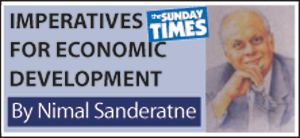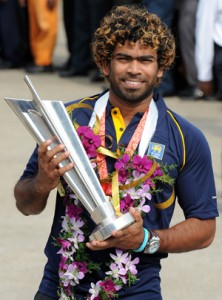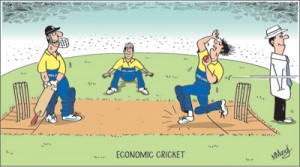Columns
Winning the T20 World Cup: When will we learn from our cricketing success?
View(s): Today we celebrate the National New Year: in a backdrop of Sri Lanka’s superb victory at the World T20 Cricket Championship. Winning this World Cup has added to the elation of the country’s cricket crazy populace and enhanced the nation’s enjoyment of the New Year sans class, community or creed. Will we ever learn the significant lessons from our success at cricket for the country’s development?
Today we celebrate the National New Year: in a backdrop of Sri Lanka’s superb victory at the World T20 Cricket Championship. Winning this World Cup has added to the elation of the country’s cricket crazy populace and enhanced the nation’s enjoyment of the New Year sans class, community or creed. Will we ever learn the significant lessons from our success at cricket for the country’s development?

The World Cup winning Lankan captain, Lasith Malinga
New Year
The Aluth Avurudu for the Sinhala population and Puththandu for the Tamils is a special time for both communities when rural households have gathered their harvests, repaid their debts and their larders are full after the harvest. Trees are full of flowers and homes are spick and span for festivities. The celebration of the National New Year is one of the colourful features of the country. It is a special time when families get-together, a time for enjoyment, a time for love and affection and a time to forget past grievances. It is a time to reunite with family, go back to the roots from town to village. It is a time for merry-making, for raban playing, singing contests and playing games. It is a time for rest and relaxation before beginning a new year and facing problems and difficulties.
Time to ponder
It is also a time to think of the future; a time when the country’s leaders should take a fresh look at how the nation’s future can be brighter and learn from the experiences of the past and our success in cricket. We must ponder over the lessons the cricket victory teaches us for the management of the economy that is in sharp contrast to the principles that ensured our success in cricket
 Merit selection
Merit selection
Foremost among the reasons for the success in cricket is that the squad for the tournament, and the team for each match, was selected on the basis of merit, form, performance, playing conditions and the strengths and weaknesses of the opponents. The team represented the pluralistic elements of language, religion and culture. The team performed in a united manner. Their team work demonstrated the old maxim that ‘the whole is greater than the sum of its parts’.
Professionalism
Another attribute that led us to success was the professionalism of the cricketers. Each player performed his task professionally, seeking assistance to correct weaknesses and advice on improving skills is provided from the best of coaches. The most talented players were selected and the best of international skills were sought for the improvement of their skills.
Do we select the best persons to manage state enterprises and institutions on the basis of skills, education, knowledge and proven experience? The Parliamentary Committee on Public Enterprises (COPE) exposed the unsuitability and inefficiency of managers and key officials in state corporations. Many of them have no proven experience or knowledge. Unlike in cricket, they are wrong horses for the courses. Huge losses and high costs of services are the consequence.
The weakening of management capacities in public institutions is a growing phenomenon. It is largely responsible for the economy not achieving its potential development. When will our public sector institutions operate on a professional basis? When will the managers of our economy be the best in the country?
Time management
A cricket match begins exactly on time, neither a minute earlier nor a minute late. If the fielders arrive on the field early and are ready to play, they have to wait till the hands of the clock reach the appointed time and the head umpire says “Play”. They have to bowl the overs within a time period and suffer heavy fines if they don’t. Time is the most scarce economic resource and a waste of time is a waste of valuable resources; capital, labour and management. Unlike in cricket, punctuality is flouted in our economic, intellectual and cultural activities. An improvement in punctuality and time management would enhance the country’s output of goods and services.
Another significant development in the country’s cricket has been the selection of the team from widespread areas of the country. We have tapped into talents of the entire population not of the cities alone. Even though ours is a team selected from a mere 20 million it crushed the Indian team selected from among 1.2 billion people.
Hard work
Poor work-ethic has been a fundamental weakness in our society. The output per worker is low and reflects in the costs of production and consequently affects the country’s competitiveness in international markets. In contrast the cricket team plays hard. There is no scope for relaxation and lethargy on the field. A few moments of ineptitude could cost a match. This “play-ethic” should be transferred from the playing field to a work ethic in the factory and office. What a difference that would make to our productivity, economic growth and development.
Lessons to learn
If only these lessons of selection on merit, professionalism, punctuality, and a pluralistic representation could be applied in our economic management, the country’s productivity could be improved immeasurably. Without such a transformation the rapid economic growth that we dream of will remain a mirage, as in the past. Can this small nation that performs so well at the world’s highest levels in cricket be an economic wonder too?
Small Western countries like England and Holland demonstrated this in the past; Japan and Singapore have shown that neither size nor natural resources define a country’s economic potential. We have demonstrated this in Cricket but fall short in economic development.
Will we ever learn?
Our cricketing success over the years has been due to the selection of the team on merit, good team work, hard work and best practices. If we select men and women of proven capacity, efficiency and integrity to manage our economy more efficiently and productively, economic development is ours. Why do we persist in playing with B and C teams in the far more important arena of the national economy?

